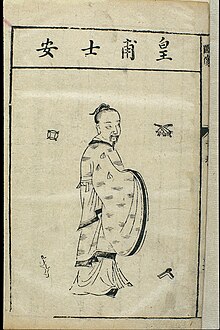Huangfu Mi
| Huangfu Mi | |||||||||||||||||||||||||||
|---|---|---|---|---|---|---|---|---|---|---|---|---|---|---|---|---|---|---|---|---|---|---|---|---|---|---|---|
 Chinese woodcut, Famous medical figures; Huangfu Mi Wellcome L0039322 | |||||||||||||||||||||||||||
| Traditional Chinese | 皇甫謐 | ||||||||||||||||||||||||||
| Simplified Chinese | 皇甫谧 | ||||||||||||||||||||||||||
| |||||||||||||||||||||||||||
Huangfu Mi (215–282), courtesy name Shi'an (Chinese: 士安), was a Chinese physician, essayist, historian, poet, and writer who lived through the late Eastern Han dynasty, Three Kingdoms period and early Western Jin dynasty. He was born in a poor farming family in present-day Sanli village, Chaona, Pingliang,[1] despite being a great-grandson of the famous general Huangfu Song.
Notable works
Between 256 and 260, toward the end of the state of Cao Wei, he compiled the Canon of Acupuncture and Moxibustion (simplified Chinese: 针灸甲乙经; traditional Chinese: 針灸甲乙經; pinyin: Zhēnjiŭ jiăyĭ jīng; Wade–Giles: Chen1-chiu3 chia3-i3 ching1), a collection of various texts on acupuncture written in earlier periods. This book in 12 volumes further divided into 128 chapters was one of the earliest systematic works on acupuncture and moxibustion, and it proved to be one of the most influential.[2] Huangfu Mi also compiled ten books in a series called Records of Emperors and Kings (Chinese: 帝王世紀; pinyin: Dìwáng shìjì). He was also the coauthor of Biographies of Exemplary Women (Chinese: 列女傳; pinyin: Liènǚ Zhuàn).
See also
References
- ^ "朝那镇三里村,乡村旅游好去处_政务_澎湃新闻-The Paper". www.thepaper.cn. Retrieved 2021-04-28.
- ^ Chinese Acupuncture and Moxibustion, 1987
External links
- 215 births
- 282 deaths
- 3rd-century Chinese historians
- 3rd-century Chinese physicians
- Cao Wei essayists
- Cao Wei historians
- Cao Wei poets
- Cao Wei science writers
- Jin dynasty (266–420) essayists
- Jin dynasty (266–420) historians
- Jin dynasty (266–420) poets
- Jin dynasty (266–420) science writers
- Chinese academic biography stubs
